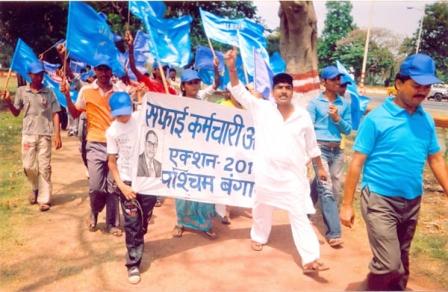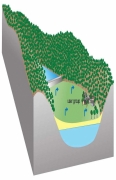/topics/conflicts
Conflicts
‘Samajik Parivarthan Yatra’ (National Yatra for Social Transformation)
Posted on 11 Oct, 2010 11:51 AM The historical ‘Samajik Parivarthan Yatra’ (Rally for Social Transformation), has been started to consolidate the gains of the movement for total eradication by liberated safai karmacharis who for the first time are bonding with one another began the journey for social change together, to inspire others who are still engaged in manual scavenging to free themselves from the obnoxious practise and regain their sense of dignity, and also to achieve their rightful claims for the rehabilitation package and dignified alternative livelihoods on the one hand; and on the other, to motivate civil society to reject the heinous practice of manual scavenging. The Bus Yatra has been planned to start from five different corners of India, and traverse through 160 districts in 20 states and finally culminate in New Delhi with a large rally. Each route has been named after an eminent person who contributed to social change in a revolutionary manner.
The historical ‘Samajik Parivarthan Yatra’ (Rally for Social Transformation), has been started to consolidate the gains of the movement for total eradication by liberated safai karmacharis who for the first time are bonding with one another began the journey for social change together, to inspire others who are still engaged in manual scavenging to free themselves from the obnoxious practise and regain their sense of dignity, and also to achieve their rightful claims for the rehabilitation package and dignified alternative livelihoods on the one hand; and on the other, to motivate civil society to reject the heinous practice of manual scavenging. The Bus Yatra has been planned to start from five different corners of India, and traverse through 160 districts in 20 states and finally culminate in New Delhi with a large rally. Each route has been named after an eminent person who contributed to social change in a revolutionary manner.
Babhli water conflict: Less water, more politics - EPW article
Posted on 01 Sep, 2010 02:13 PMThis paper published in the Economic and Political Weekly highlights the recently growing conflicts over water sharing between states in India and argues that the intensity and periodicity of these conflicts are increasing and that these conflicts are expected to get worse with the increasing uncertainty of rainfall and water availability. The document goes on to describe the latest one in the news, the conflict between Maharashtra and Andhra Pradesh over the Babhli barrage.
The indigenous struggle- A look at three South American films on water rights
Posted on 31 Aug, 2010 02:51 PMThis past weekend was the only international film festival on water, worldwide—Voices from the Water, held in Bangalore in several different locations. Working for a water NGO, I made my schedule free to catch up on some of these movies, to understand what the current issues are and what the film circle is capturing through their lens that we don’t necessarily see from our biased eyes.
Community organisation in groundwater management – A presentation by ACWADAM
Posted on 27 Aug, 2010 04:01 PM This presentation by ACWADAM on community organization in groundwater management deals with the processes involved in people’s mobilization and participation. The requisites of groundwater management include: resource enhancement, demand management, equitable distribution, institutional mechanism and controlling of free riding. It deals with groundwater management at a local scale when compared to aquifer management.
This presentation by ACWADAM on community organization in groundwater management deals with the processes involved in people’s mobilization and participation. The requisites of groundwater management include: resource enhancement, demand management, equitable distribution, institutional mechanism and controlling of free riding. It deals with groundwater management at a local scale when compared to aquifer management.
Aquifer management involves:
- Identification of aquifer on the basis of geology;
- Identification of recharge and discharge areas;
- Assessment of aquifer capacity and yield through aquifer mapping;
- Protection of recharge area and increasing the groundwater level through artificial recharge in recharge area (based on the geology);
- Treating groundwater as a common property resource;
- Encouraging community use of groundwater and restricting individual use;
- Putting in place an institutional mechanism and legal back up for community groundwater management;
- Awareness generation regarding groundwater and science of hydrogeology.
Floods, drinking water contamination, mining and waterbodies, water bills, water conflicts - News roundup (1-7 August 2010)
Posted on 07 Aug, 2010 04:51 PMFloods: lessons to be learnt from the massive flooding in Surat city
A report by IIM criticises the way in which dams are managed in the country and calls for the need to apply Management Science / Operations Research techniques and information technology to improve dam management and prevention of floods
Duel among duals - Popular science of basaltic hydrogeology in a village of Saurashtra - A paper by CAREWATER
Posted on 03 Aug, 2010 07:57 PM The report by Carewater INREM Foundation deals with the duel between popular science used in decision making by farmers and the formal science of hydrogeology that is based on scientific data collection. These two parallel streams of knowledge exist together, sometimes complement, and at other times are at conflict. People’s knowledge on hydrology is not ‘dying’, but thriving and growing well, refreshed continually by interfaces with science. In hard rock areas, the high hydrogeologic variability makes observation as important as theory since it is localized, pervasive and relevant to the needs of people.
The report by Carewater INREM Foundation deals with the duel between popular science used in decision making by farmers and the formal science of hydrogeology that is based on scientific data collection. These two parallel streams of knowledge exist together, sometimes complement, and at other times are at conflict. People’s knowledge on hydrology is not ‘dying’, but thriving and growing well, refreshed continually by interfaces with science. In hard rock areas, the high hydrogeologic variability makes observation as important as theory since it is localized, pervasive and relevant to the needs of people.
Women and Water: A report by the National Commission for Women
Posted on 29 Jul, 2010 10:56 PMThis report by the National Commission for Women looks at social conflict and tension that arise due to water crises and analyses the impact of these on women. The stress on water resources is a result of rapidly rising population and changing lifestyles, which have increased the need for fresh water. Intense competition among water users from agriculture, industry and domestic sector is pushing the ground water table deeper. Women bear the burden of fetching drinking water in rural areas and if opportunity costs are taken into account, it would translate to about 150 million women days each year. This amounts to a loss of a whopping 10 billion rupees per year to the national exchequer.
Jagatguru Shankaracharya Swami Swaroopanand and Swami Ramdev offer support to Dr. G.D. Agrawal on his fast unto death
Posted on 23 Jul, 2010 11:42 PMJagatguru Shankaracharya Swami Swaroopanand of Dwarkapeeth sent his personal emissary Swami Dharanand to convey his support to Dr. G.D. Agrawal whose third fast-unto-death to ensure the natural flow in river Bhagirathi (Ganga) from Gangotri to Uttarkashi entered its second day. Yesterday (July 21) Swami Ramdev spent an hour in the evening with Dr. Agrawal and offered his full support.
March 2010 Issue of Water Feeder
Posted on 30 Apr, 2010 05:15 PM
Guest post by Pranab, Sucharita & Priyabrat
Odisha State Center
With summer scorch intensifying, pinch of water woes and conflicts are becoming more painful in Odisha this year. While pollution continues to be the concern, scarcity and quality of drinking water across Odisha, both from rural and urban landscapes have become the major water news in vernacular media. With news of more and more tube wells going defunct/ drying up, water-supply systems becoming ineffective and quality of surface and ground water plummeting with metal and biological pollution, this issue of Water Feeder attempts to reiterate the urgency of thinking and action towards alternate management of our water resources. It also underlines grimmer months ahead, with summer intensifying further and hydrological year approaching its end.
South Asia Rivers should be source of uniting people, not dividing them
Posted on 23 Apr, 2010 03:27 PMGuest Post by Himanshu Thakkar
New Delhi: A workshop organised yesterday on the sidelines of a South Asia civil society gathering under the banner of Assembly of a Union of South Asian Peoples at Jawaharlal Nehru University came up with a set of recommendations to address the question of conflict over shared rivers in the region. The key message from the meeting, which addressed issues pertaining to Pakistan, Bangladesh, Sri Lanka, Bhutan, Nepal and India, was that South Asia’s rivers should be a source of uniting peoples, not dividing them. The Assembly is being organised as a civil society counter to the official SAARC meeting to be held in Thimpu from 28-29 April 2010.






